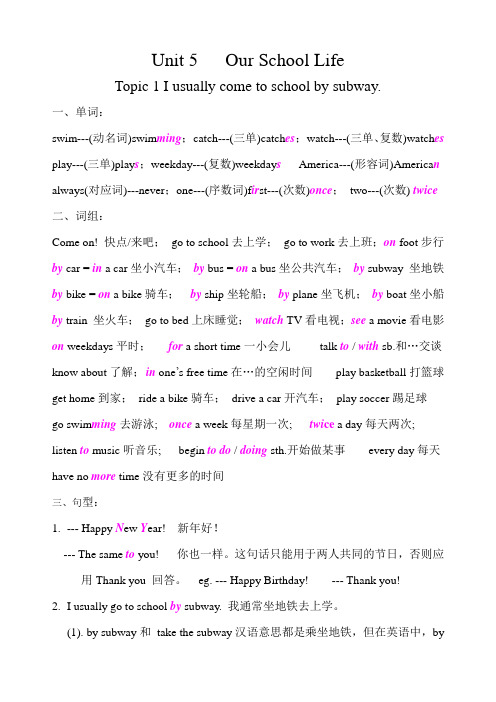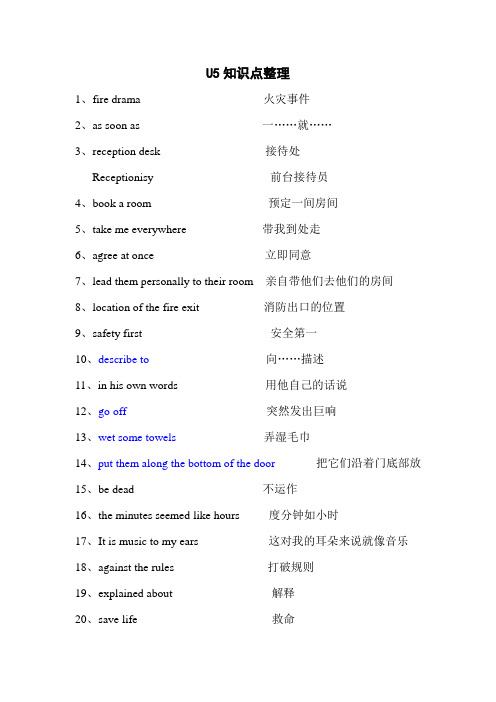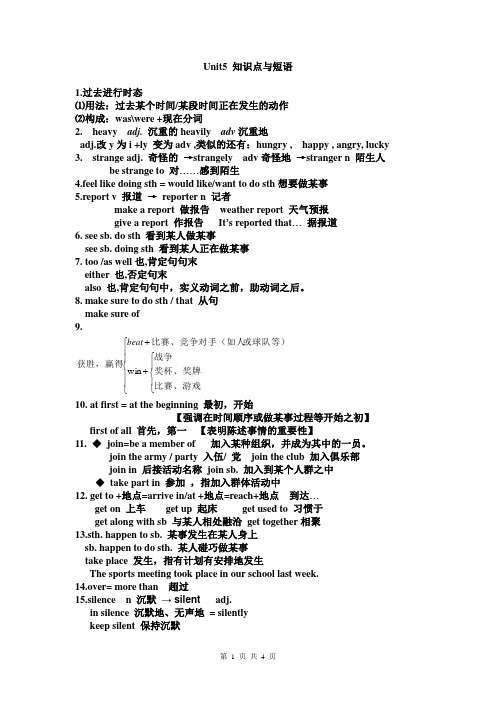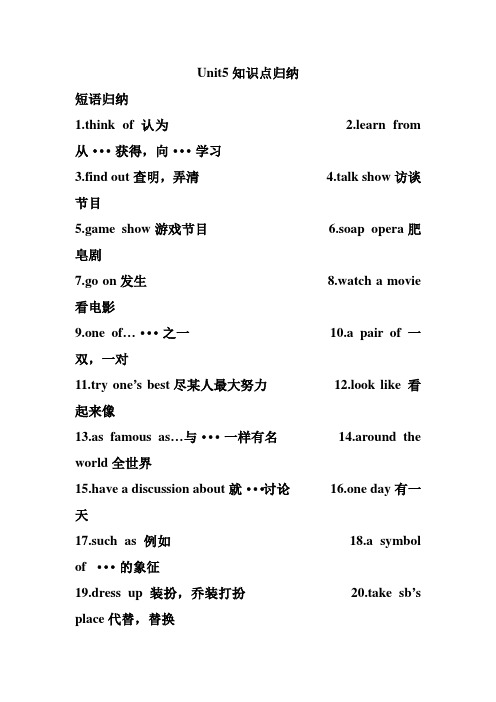U5词汇知识点
- 格式:doc
- 大小:44.50 KB
- 文档页数:2

Unit 5 Our School LifeTopic 1 I usually come to school by subway.一、单词:swim---(动名词)swim ming;catch---(三单)catch es;watch---(三单、复数)watch es play---(三单)play s;weekday---(复数)weekday s America---(形容词)America n always(对应词)---never;one---(序数词)f ir st---(次数)once;two---(次数) twice 二、词组:Come on! 快点/来吧;go to school去上学;go to work去上班;on foot步行by car = in a car坐小汽车;by bus = on a bus坐公共汽车;by subway 坐地铁by bike = on a bike骑车;by ship坐轮船;by plane坐飞机;by boat坐小船by train 坐火车;go to bed上床睡觉;watch TV看电视;see a movie看电影on weekdays平时;for a short time一小会儿talk to / with sb.和…交谈know about了解;in one’s free time在…的空闲时间play basketball打篮球get home到家;ride a bike骑车;drive a car开汽车;play soccer踢足球go swim ming去游泳; once a week每星期一次; twi ce a day每天两次; listen to music听音乐; begin to do / doing sth.开始做某事every day每天have no more time没有更多的时间三、句型:1.--- Happy N ew Y ear! 新年好!--- The same to you! 你也一样。

U5知识点整理1、fire drama 火灾事件2、as soon as 一……就……3、reception desk 接待处Receptionisy 前台接待员4、book a room 预定一间房间5、take me everywhere 带我到处走6、agree at once 立即同意7、lead them personally to their room 亲自带他们去他们的房间8、location of the fire exit 消防出口的位置9、safety first 安全第一10、describe to 向……描述11、in his own words 用他自己的话说12、go off 突然发出巨响13、wet some towels 弄湿毛巾14、put them along the bottom of the door把它们沿着门底部放15、be dead 不运作16、the minutes seemed like hours 度分钟如小时17、It is music to my ears 这对我的耳朵来说就像音乐18、against the rules 打破规则19、explained about 解释20、save life 救命21、As we all know 如同我们所知道的22、hearing, smell, sight, taste and touch 听觉、嗅觉、视觉、味觉、触觉23、the ability to know 有能力知道24、For example 比如25、look around quickly 快速环顾四周26、stare at you 凝视你27、Until now 直到现在28、be carried out 被执行29、announce the results of some new experiments 宣布一些新实验的结果30、work in this way 用这种方法工作31、blow a whistle 吹哨子32、in random order 用任意顺序33、wear the blindfold 戴眼罩34、be being watched 正在被看着35、the results are accurate 结果精确36.keep one’s balance 保持平衡Lose one’s balance 失去平衡。


Unit5 知识点与短语1.过去进行时态⑴用法:过去某个时间/某段时间正在发生的动作⑵构成:was\were +现在分词2. heavy adj. 沉重的heavily adv 沉重地adj.改y 为i +ly 变为adv ,类似的还有:hungry , happy , angry, lucky3. strange adj. 奇怪的 →strangely adv 奇怪地 →stranger n 陌生人be strange to 对……感到陌生4.feel like doing sth = would like/want to do sth 想要做某事5.report v 报道 → reporter n 记者make a report 做报告 weather report 天气预报give a report 作报告 It ’s reported that … 据报道6. see sb. do sth 看到某人做某事see sb. doing sth 看到某人正在做某事7. too /as well 也,肯定句句末either 也,否定句末also 也,肯定句句中,实义动词之前,助动词之后。
8. make sure to do sth / that 从句make sure of9.⎪⎪⎩⎪⎪⎨⎧⎪⎩⎪⎨⎧++比赛、游戏奖杯、奖牌战争或球队等)比赛、竞争对手(如人获胜,赢得win beat 10. at first = at the beginning 最初,开始【强调在时间顺序或做某事过程等开始之初】first of all 首先,第一 【表明陈述事情的重要性】11. ◆ join=be a member of 加入某种组织,并成为其中的一员。
join the army / party 入伍/ 党 join the club 加入俱乐部join in 后接活动名称 join sb. 加入到某个人群之中◆ take part in 参加 ,指加入群体活动中12. get to +地点=arrive in/at +地点=reach+地点 到达…get on 上车 get up 起床 get used to 习惯于get along with sb 与某人相处融洽 get together 相聚13.sth. happen to sb. 某事发生在某人身上sb. happen to do sth. 某人碰巧做某事take place 发生,指有计划有安排地发生The sports meeting took place in our school last week.14.over= more than 超过15.silence n 沉默 → silent adj.in silence 沉默地、无声地 = silentlykeep silent 保持沉默16.remember to do sth记得去做某事(此事还未做)remember doing sth记得做过某事(此事已做完)17.surprise v 使吃惊→surprising adj. 令人吃惊的→surprised adj. 吃惊的be surprised to do sth 做某事很吃惊to one’s surprise 使某人吃惊的是in surprise 吃惊地be surprised at 对……感到吃惊18.hear sb. do sth听见某人做某事;hear sb. doing sth听见某人正在做某事hear + that 从句。

知识归纳与拓展【单词分析】1.wild (adj.)野生的wild animals (n.)自然环境,野生状态in the wild2.free (adj.) 自由的,不受拘束的be free to do sth.自由的做某事for free 免费的3.die (vi.) 死dead (adj.) 死的dying (adj.)奄奄一息的death (n.) 死,死亡Eg:His father died last week.She cried out after knowing his husband's death.He found a dead bird in the garden.The dying man was saved by a kind-hearted lady.4.mean (vt.) 意思是,意味着meaning (n.) 意思meaningful (adj.)有意义的meaningless (adj.) 无意义的Eg:What’s the meaning of the word?= What does the word mean?5.born (adj.) 出生的be born birth (n.) 出生at birthEg: I weighed four kilos when I was born.= I weighed fours kilos at birth.4.beginning (n.) 开始,起初begin (vt.&vi.) 开始开始in the beginning =at first ; 在……的一开始at the beginning of ……;开始做某事begin to do = begin doing一开始, 起初(at first) in the beginning不与of连用。
◇at the beginning 常与of 连用,表“在…之初”◇at the beginning 也可单独使用,表示“起初,5.sad(adj.) 伤心的sadly (adv.) 令人伤心地sadness (n.)伤心sadly = to one’s dnessEg:Sadly, both he and my mother died of cancer6.mainly( adv.) 主要地,大部分main (adj.) 主要的Eg:Deer live mainly in forests7.danger (n.) 危险dangerous (adj.) 危险的Eg:He is in danger of losing his job if he goes on like this.The sick person is now out of danger.Shooting off fireworks can be dangerous.8.action (n.) 行动;行为act (vt.& vi.) 行动,表演active (adj.) 积极的,活跃的actively adv.积极地,活跃地take action to do sth.= act to do sth.9.closed (adj.) 关闭的; 紧密的,亲密的close (vt.&vi.) 关,关闭closely (adv.) 紧密地10.lost (adj.) 迷路的,迷失的lose (vt.) 遗失,失去get lost = lose one’s way11.the same ……as = as……as…..Eg:Y ou are as tall as me. = Y ou are the same height as me. (heavy,old,big / weight,age,size)12.hunter (n.) 猎人hunt (vt.& vi.) 打猎,猎杀13.1iving (n.) 生存,生计living (adj.) 活的,现存的live (vi.) 居住,生活14. sell的过去式sold;卖得好sell well;卖光sell out15.illness (n.) 疾病ill (adj.) 生病的ill和sick都是形容词,表示“生病的”,但二者有区别;ill只可作表语;而sick既可作表语,也可作定语.如:Eg:①He is ill / sick in hospital.他生病住院了.②He is a sick boy.(正)这男孩儿生病了. He is an ill boy.(误)16.because of+短语;because +句子Eg:I was late because of the heavy rain.= I was late because it rained heavily.17.accept(v.)接受,收到receive(v.)收到1)accept用作动词,意为“接受”,指经过考虑,由主观意志来决定接受,动作者本身是主动的He couldn't accept our advice but our gifts.他们不能接受我们建议但接受了我们的礼品。

Unit5知识点归纳短语归纳1.think of 认为2.learn from 从···获得,向···学习3.find out查明,弄清4.talk show访谈节目5.game show游戏节目6.soap opera肥皂剧7.go on发生8.watch a movie 看电影9.one of…···之一10.a pair of 一双,一对11.try one’s best尽某人最大努力12.look like 看起来像13.as famous as…与···一样有名14.around the world全世界15.have a discussion about就···讨论16.one day有一天17.such as 例如18.a symbol of ···的象征19.dress up装扮,乔装打扮20.take sb’s place代替,替换21.do a good job干得好22.something enjoyable令人愉快的东西23.interesting information有趣的资料23.follow the story跟随故事的情节24.make a plan制定一个计划25.can’t stand 不能忍受26.a piece of news一则新闻27.may not be 可能不是e out 发行,出版用法集萃:1.let sb do sth让某人做某事2.plan to do sth计划/打算做某事3.hope to do sth希望做某事4.happen to do sth 碰巧做某事sth happens to sb 某人发生了某事5.expect to do sth盼望做某事6.how about doing sth…?做···怎么样?7.be ready to do sth愿望迅速做某事,准备好做某事8.try one’s best to do sth某人尽力做某事9.be famous for 因为…而出名10.t ry to do sth 努力做某事11.m ost of +可数名词复数,后接谓语动词复数形式,most of+不可数名词,谓语动词用单数12.n ot as/so…as不如···那样13.m ind doing sth介意做某事14.c an’t stand doing sth 不能忍受做某事15.w hat’s going on 发生了什么1.This is Jay’s new CDs. What do you think____them?A. atB. ofC. onD. to2.My mother told me ____more water.A. drinkingB.drankC.to drinkD.drink3. I like soap operas, she likes____, too.A.itB.theyC.themD.the ones4. Do you mind ____the windows?A.to openB.opensC.openingD.opened5.-I usually go there by train.-Why not____by boat for a change?A.to try goingB.trying to goC.to try and goD.try going6. I want ____a teacher when I grow up.A.to beB.toC.beD.being7.This summer they didn’t plan__to London for their holidayA.to go B.going C.gone D.went8.We’re trying our best_______toys away when we see our teacherA.putB.puttingC.to put9.It’s cold outside,please put on______A.warm something B.anything warm C.warm anything D,something warm10.We happened ___her at the station ,She looked worriedA.meetsB.meetingC.meetD.to meet11.I want ___young and beautifulA.isB.areC.to beD.am用所给的词的适当形式填空12The girls enjoy ____(sing)this song in English.13Do you mind me____(open) the window?14How about ____(play)foot ball after school?15Do you want____(know)about my school day.16I helped my parents ____(do)some housework yesterday.二.完形填空。
第五单元:一、重点词汇mine我的your 你的,(你们的)his 他的hers 她的theirs 他们的,她们的ours 我们的climbing (正在)攀爬eating(正在)吃playing (正在)玩jumping(正在)跳drinking(正在)喝sleeping (正在)睡觉一、掌握的短语climb tree 爬树play football 踢足球look at 看 a beautiful painting 一幅美丽的画in the kitchen在厨房play with each other一起玩耍drink water 喝水listen to music 听音乐read books读书二、名词性物主代词和形容词性物主代词表示所有关系的代词叫做物主代词,即表示事物主人的代词。
它包括名词性物主词,常用来修饰、限定后面的名词。
如:This is my book(这是我的书)、That is his bag(那是他的书包)2、名词性物主代词需独立使用,后面不能跟名词,它相当于“形容词性物主代词+名词”。
如:It’s mine.(它是我的)词尾若有哑音e,去e再加-ing。
“一辅重闭”作尾巴,双写后加-ing。
还有一点要注意,ie变y再加-ing。
五、重点句型1、询问物品的归属句型结构:问:Whose(+物品)+are there/those?(这些/那些是谁的?)答:There are+名词性物主代词。
(它们是···的。
)或:There are+形容词性物主代词+物品。
(它们是···的···)。
例:问:Whose pens are these? (这些钢笔是谁的?)答:They are mine.(它们是我的)。
2、如要询问单个物品的归属的句型结构是:问:Whose(+物品)+is it/this/that?(它/这/那是谁的?)答:It’s+名词性物主代词。
1.quality n. 质量;品质;性质of poor quality 质量差of good/high quality 质量好/高quantity n. 数量a quantity of = quantities of 大量的---可修饰可数名词,也可修饰不可数名词;做主语时,谓语动词的单复数要根据quantity 本身的单复数而定,而不能根据它所修饰的名词来定。
2.generous adj. 慷慨的;大方的;宽容的be generous to sb. 对某人宽容/大方be generous with sth. (用钱等)大方3.mean adj. 吝啬的;自私的;卑鄙的v. 意欲,打算mean to do sth. 打算做某事mean doing sth. 意味着做某事be meant to do 要做,必须做What do you mean by ……? 你说/做…..是什么意思?be mean with/about……对…..吝啬/小气be mean to sb. 对某人刻薄4.devote vt. 献身;专心于devoted adj. 热爱的,全心全意的devotedly adv.devotee n. 现身某事物的人devotion n. 深爱,挚爱devote …to …把…献给…devote oneself to 致力于;献身于;专心于be devoted to 致力于;专用于后面跟名词或动词的-ing形式,类似的短语有:object to 反对look forward to 盼望pay attention to 注意lead to 引领,导致stick to坚持get/be used to 习惯于get/be accustomed to 习惯于get down to 开始认真做5.willing adj. 乐意的,自愿的be willing to do sth. 乐意做某事be willing for sb. to do sth. 愿意为某人做某事6.trouble 构成的短语in trouble 处于不幸中,在监禁中ask for trouble 自寻烦恼get into trouble遇到麻烦,出事have trouble in doing sth. 做某事有困难make trouble 制造麻烦save/spare trouble 省事;避免麻烦7.fight vt. 打仗,打架Fought---foughtfight for 为…..而战fight against 与……作战(斗争)fight with 与……作战;(并肩)作战fight back 还击;忍住fight one’s way back(out,ect.) 费很大劲恢复,打回去(出去等)8.prison构成的短语put ……in prison 把….投入监狱send …… to prison 同上throw/cast ……into prison 同上go to prison 入狱be in prison 在狱中,被监禁be taken to prison 被关入监狱break (out of) prison 越狱9.found vt. 建立;建设;成立---founded---foundedbe founded on/upon sth. = be based on 建立在某基础上;建在某物之上founder n. 创建者,奠基人foundation n. 基础;建立10.advise 的用法归纳:advise + n.advise sb. to doadvise doingadvise that +从句(should) doadvise sb. on sth.advise wh- to doadvise sb. not to do sth. 建议某人不要做某事advise sb. against doing sth. 同上11.continue +名词,动名词或不定式continue + 表语(形容词)“继续处于某种状态”12.as a matter of fact (in fact) 事实上,实际上;事实恰恰相反in factin actual fact 事实上,实际上in realityin effect13.choosechoose +n. 选中choose from/between 从……中选中choose sb. as/for 选某人当……choose sb. sth. = choose sth. for sb. 为某人选某物choose wh- to do选……做……cannot choose but to do 只好做……14.vote vt. 投票;选举、n.投票;选票;表决vote for 投票赞成;头某人的票vote against 投票反对vote out 以投票方式罢免某人vote down 投票否决vote on/upon 对…投票表决vote sth through 表决通过(提案等)vote in 以投票方式选出某人15.attack vt. 进攻,攻击,抨击;(疾病)侵袭,侵害n. 攻击,进攻;病情发作(可数名词)make an attack on/against ……=attack ……攻击,袭击,抨击under attack 遭受攻击air attack 空袭 a heart attack 心脏病发作16.blow up a. 炸毁,(使)炸得粉碎blow away 枪杀;彻底战胜;使(某人)大为惊讶blow in 不期而至blow out 吹灭,熄灭blow off 结束恋爱关系blow over平息下来17.be equal to 表示“与……相等”be / feel equal to (doing) sth. 还可表示“胜任;经得起”equal “等于;比得上”18.work on 致力于努力影响说服某人做某事例子:My parents spent the weekend working on me to go on holiday with them.work out 算出,制订出work at 从事,致力于work one’s way 努力前进获得work away不停地工作work up 使激昂,激起,发展成work 做名词构成的词组:out of work = out of a job 失业in work 有工作go to work 去上班off work 在休班at work 在工作中,在上班after work 下班begin / start work 开始工作19.动词see, find, witness 等有时间或地点名词作主语,以增添语言色彩,意为“(在某段时期或某地)发生(某情况),经历,经受。
Unit5 In London知识点一.Vocabulary1.chemist’s 药店 2 tailor’s 裁缝店3.barber’s理发 4.baker’s面包房5.grocer’s 杂货铺 6.butcher’s肉店7.jeweller’s珠宝店8.carpenter’s木工店9.almost几乎10.destroy摧毁11.brick砖块12.stunt 特技13.rescue拯救14.grab抓住二.Phrases1.bigger and richer更大更富有2.north of the river河的北部3.burned for four days燃烧了四天4.go skiing去滑雪5.cook spaghetti煮意大利面6.p lay rugby打橄榄球7.walk along一直走8.a loud crash一声巨响9.in the countryside 在乡下10.each other互相11.arrive at到达三.Sentences1.Have you ever seen a big fire? No ,I haven’t.你见过一场大火吗?不,我没有。
2.Has he ever rescued people in real life? Yes,he has.他在现实生活中救过人吗?是的,他有过。
3.She has never made a film. 她从来没有做过电影。
4.Have you ever been to Mexico?你去过墨西哥吗?No,I haven’t,but my cousins went there last year.我没有,但是我的表兄弟们去年去过那里。
5.Has your brother ever tried windsurfing?你的哥哥试过风帆冲浪吗?Yes,he has.We all tried that on holiday last summer.是的,我们去年夏天假期都有试过那个。
初二下册U5知识点总结一.语法知识1. You look excited.你看起来很兴奋这个句子是“主语(I)+ 连系动词(look)+ 形容词(excited)”的结构,我们通常称之为“主系表结构”。
(1)表示状态的连系动词有:be (是)、look(看起来)、sound(听起来)、taste (尝起来)、smell(闻起来)、feel(感觉起来)、touch(触摸起来)、seem(似乎)、keep(保持)、stay(保持、维持)、remain(保持)等。
(2)表示转变或结果的连系动词有:get(变得)、turn(转变)、go(变)、fall(变成)、become(变成)、grow(逐渐变得)等。
(3)“系动词+形容词+介词”结构be proud of be pleased withbe afraid of be bored withbe angry with/at sb. be angry with/at sth.be nervous about be satisfied withbe strict with sb. be strict in/about sth.2. one of … 意为“… 之一”,后面常跟可数名词的复数形式或复数人称代词宾格,其谓语动词用单数。
some of … 意为“… 中的一些”,其谓语动词单复数形式由of 后面的名词或代词决定。
3. none 不定代词,意为“没有一个,毫无”。
none 可作主语和宾语等。
none of 短语做主语时,谓语动词既可用单数,也可用复数。
4. can 和be able to 表示“能力”时是同义词。
can只用在现在时和过去式中。
be able to可用于各种时态。
5. because 意为“因为”后面跟完整的句子。
because of 意为“由于,因为”后面跟名词、代词或名词短语。
because of 有时相当于thanks to 意为“多亏,由于”。
Unit5 Signs
一、短语
1.at a shopping centre在一个购物中心
2.be careful小心
3.the wet floor潮湿的地板
4.see a juice shop看见一家果汁店
5.want some juice想要一些果汁
6.see that public sign看见那个公共标志
7.go to the bookshop去书店
8.can’t litter不能扔垃圾
9.want to go in 想要进去10.take your juice into the shop把你的果汁带进商店11.can’t eat or drink不能吃喝12.eat some noodles吃些面条
13.in the restaurant在餐馆14.smell it闻到它
15.at a shopping centre 在一个购物中心16.a fruit shop 一家水果店
17.these signs这些标志18. the little bird这只小鸟
19.say to the little bird对小鸟说20.say to the girl对女孩说
21.so happy那么高兴22.my birthday我的生日
22.dirty shirts脏的衬衫
23.call the metro“underground”/“subway”称地铁为“underground”/“subway”
24.in the US在美国25.in the UK在英国
26.be on an outing/go on an outing远足27.in the forest在森林里
28.feel hungry and tired 感觉又饿又累29.look for the banana 找香蕉
30.bring some bananas for lunch带来一些香蕉作为午餐
31.give Sam a banana给山姆一个香蕉32.walk on 继续走
33.find a sign on a tree发现树上的一个标志
34.see a lot of monkeys around them看见他们周围许多猴子
35.look at Bobby’s bananas看着鲍比的香蕉
36.design signs for public places为公共场所设计标志
37.ask and answer the questions问答问题
38.put it in the desk把它放在课桌里
39.know some public signs了解公共标志40.画画说说draw and say
41.听和选listen and choose
二、句子
1. What does the(this/that)sign mean?.这个/那个标志什么意思?
It means “Wet floor”. 它的意思是“小心地滑”。
It means the floor is wet. 它的意思是地板是潮湿的。
2. What does it mean? 它什么意思?
It means you can’t eat or drink there. 它的意思是不能在那儿吃吃喝喝。
It means you can’t litter here. 它的意思是不能在这里扔垃圾。
3. Do you want some juice? Yes, please.
你想要一些果汁吗?好的,请给我一些。
4. Now they are eating some noodles in a restaurant.现在他们正在餐馆里吃面。
5. Is someone smoking? 有人正在吸烟吗?
I can smell it. 我能闻到它。
6. Please don’t smoke here.请不要在这里吸烟。
Can you see that sign? 你看到那个标志了吗?
It means you can’t smoke here.它意思是你不能在这里吸烟。
7. Why are you so happy today? 你今天为何如此开心?
Because today is my birthday.因为今天是我的生日。
8. Bobby and Sam are on an outing in the forest. 鲍比和山姆正在森林里远足。
9. He feels tired and hungry.他感到又累又饿。
10. I brought some for lunch. 我带了一些当午餐。
11. Then, they see a lot of monkeys around them.然后他们看见许多猴子围着他们。
12. I know why we shouldn’t eat bananas here.
我知道为什么我们不应该在这里吃香蕉了。
13. Where can we put it? 我们能把它放哪儿?
We can put it on the wall. 我们能把它放在墙上。
14. No eating or drinking. 请勿吃喝。
15. No littering. 请勿扔垃圾。
16. No parking. 请勿停车。
17 . No smoking. 请勿吸烟。
18. Danger! 危险!19. Wet floor. 小心地滑。
20. No swimming. 请勿游泳。
三.语言点
1.认识其它的一些标志
What does the sign mean? It means you can’t swim here.(No swimming.)
What does the sign mean? It means you can’t fish here. (No fishing.)
What does the sign mean? It means you can’t bring you r dog in.(No pets.)
What do these / those signs mean? They mean…
这些标志什么意思?他们的意思是……
2.关于公共标识的构成
(1)No + doing (动名词)
e.g. No eating or drinking. No littering. No parking.
No smoking. No swimming.
(2)名词或名词短语
e.g. Danger! Wet floor.
(3)祈使句
e.g. Keep off the grass. 不要践踏草坪。
Be quiet. 安静。
(4)No + 名词
e.g. No pets. 禁止携带宠物进入。
No mobile phones. 禁止使用手机。
No cameras.禁止拍照。